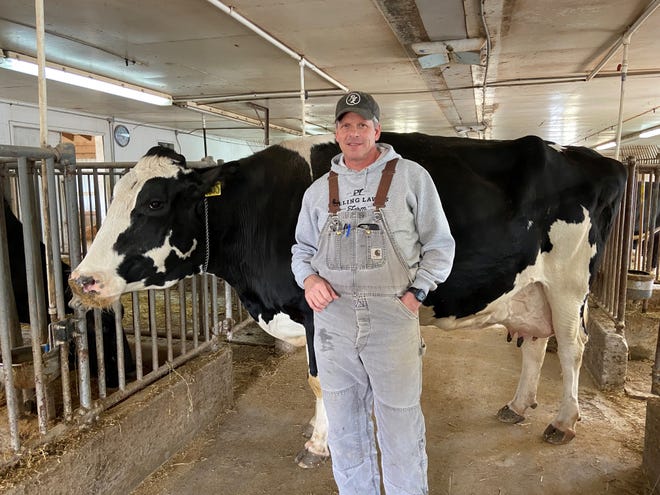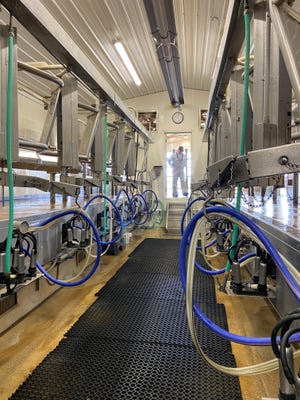Twice each day, dairy cows line up 12-at-a time to be milked at Rolling Lawns Farm in Greenville. As the animals enter the milking parlor, caretakers clean and sanitize each cow’s udder before attaching an automatic milking unit.
The entire milking process takes about 8 minutes per animal, with milk going from the cow to a customer’s glass in fewer than 6 hours.
“Cows look forward to the milking process,” says Michael Turley, owner and operator of the Bond County farm. “You have your early arrivers, who are first in line, and your cows who are last in line but they’re always in the same place every day.”

The farm has been home to purebred Holsteins for more than 100 years, starting when Turley’s great-grandfather founded the dairy. Pedigrees and registration documentation help track each animal’s ancestry.
For example, Baltimore Barb represents the 29th generation in her family at the farm. Her predecessors came over from the Netherlands in 1882, when many U.S. farmers began using European genetics to grow the dairy sector.
More:Third Friday’s theme is country music inspired
With 120 cows at Rolling Lawns Farm, there’s a lot of personal interaction between each animal and their handlers.
“We see each animal every day and can pretty much tell when they’re having a good day or an off day – just like people,” Turley says.
Each cow has her own personality, too. Lovely, a 7-year-old cow whose family has been on the farm for 75 years, is the biggest and most playful. Turley says she’s also the most spoiled.
More:Stay cool out there and more thoughts on gun control
“She’s seen me pretty much every day of her adult life and she knows she’s going to get cared for,” he says. “She exemplifies the type of care that we try to give our cows every day. There’s a lot of trust and interaction between the animal and the owners.”
In 2017, Turley expanded his business to include a processing, bottling and retail facility 8 miles down the road from the farm. Customers at The Milk House can choose from a selection of white and flavored milks, as well as homemade ice cream. They can also watch fresh milk from the farm undergo pasteurization, which includes heating to remove bacteria, before it’s turned into dairy treats.

Turley says his goal with adding transparency to how dairy products are made is to demystify any misconceptions shoppers might have. That includes answering questions about how his family and employees raise cows and the use of practices such as antibiotics.
“I love answering those types of questions because we can assure them about the safety of the product,” he says. “There are no antibiotics [in milk] because of the rigorous testing that not only our farm does, but every dairy farm in the United States undergoes. There isn’t a more heavily regulated product than milk.”
Source: lincolncourier.com









